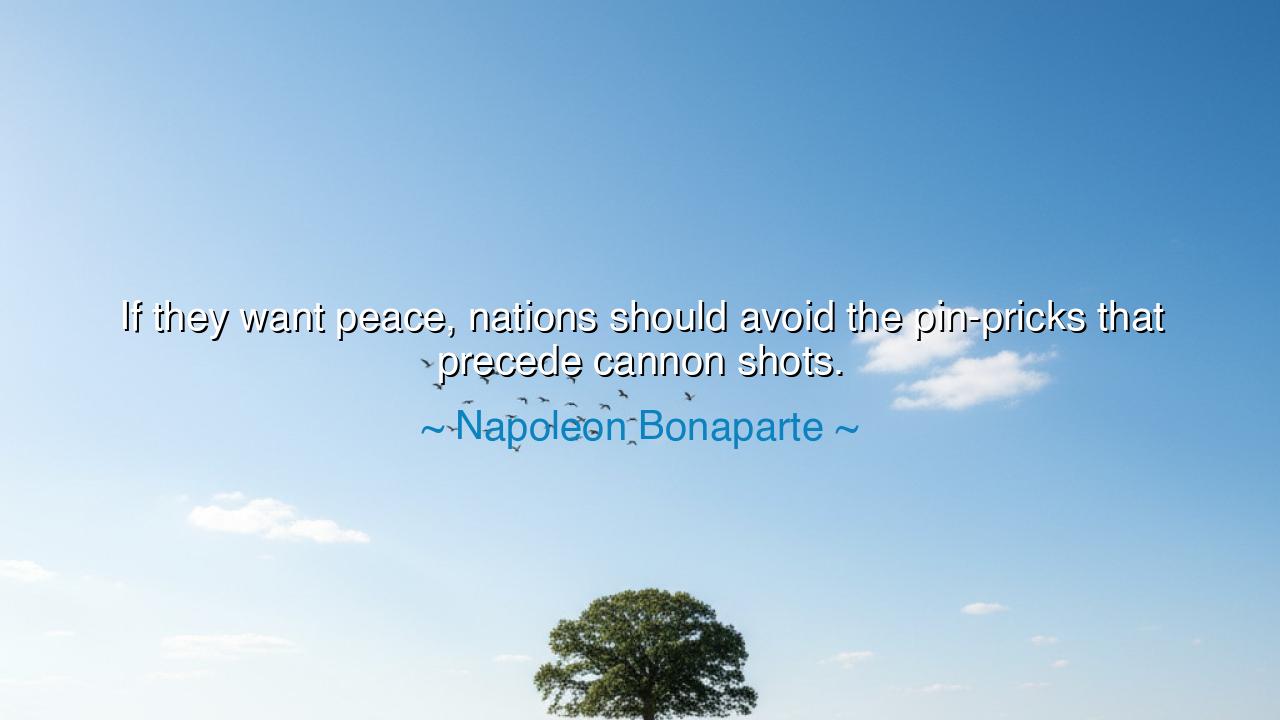
If they want peace, nations should avoid the pin-pricks that






Hear the stern warning of Napoleon Bonaparte, master of battle and student of nations, who declared: “If they want peace, nations should avoid the pin-pricks that precede cannon shots.” These words, born from the mind of a man who commanded armies across Europe, carry the weight of both wisdom and irony. For Napoleon, though often the bringer of war, understood the delicate balance that separates peace from destruction. He reminds us that it is not always the great insult, nor the mighty invasion, that unleashes bloodshed—but the small provocations, the pin-pricks, that fester until they awaken the fury of war.
Mark this well, O seeker of truth: peace is fragile, like a vessel of glass. It is not shattered in an instant without cause, but is first cracked by countless little strains—an insult at a border, a tariff unjustly placed, a diplomat’s sneer, a slight left unaddressed. These small injuries seem harmless, but they accumulate, and soon nations find themselves caught in the momentum of anger. Thus Napoleon teaches that if peace is truly desired, it is not enough to prevent armies from marching; one must also restrain the smaller acts of pride, arrogance, and provocation that make war inevitable.
History reveals this truth again and again. Consider the road to World War I, when Europe’s great nations were bound in treaties and rivalries. The assassination at Sarajevo was the cannon shot, but it was not born in isolation. For decades before, there had been pin-pricks: the scramble for colonies, the naval arms race, the endless insults between neighbors, each tolerated, each adding weight to the powder keg. When the spark finally fell, the world was consumed. Had those pin-pricks been restrained, had nations acted with humility instead of pride, perhaps the cannons would never have fired.
Or look to the tale of ancient Rome, whose Republic often found itself at war with its neighbors not through sudden invasion, but through a series of small offenses. A trade dispute, a broken treaty, a quarrel between allies—each minor in itself, but each like a thorn in the flesh, inflaming resentment until swords were drawn. The wise senators knew that to keep peace required vigilance not only against armies but against the petty grievances that, left unchecked, become causes for slaughter.
Yet this lesson is not for nations alone, but for every soul. In our lives too, the great conflicts are rarely born in a single moment. It is the small offenses, the careless words, the wounded pride, the repeated neglect, that gather like drops of poison in the heart. A quarrel between friends, between lovers, between families—how often does it begin with a pin-prick? And when pride refuses to yield, those pin-pricks turn into cannon shots of rage, severing bonds that once seemed unbreakable.
Therefore, the teaching of Napoleon must be heeded in every sphere: if you desire peace, guard against the small provocations. Nations must act with dignity, not arrogance; families must act with kindness, not neglect. Do not dismiss the little injuries, but tend to them quickly, with humility and care, before they grow into battles that no one wished for. For the smallest thorn, if ignored, can fell the mightiest beast.
The lesson for us is clear: peace is not preserved by silence of cannons alone, but by the discipline of hearts and tongues. Whether in the councils of nations or the intimacy of the home, do not provoke where there is no need, do not strike where patience could heal, do not let small quarrels grow into great wars. For as Napoleon, conqueror and strategist, declared with rare clarity: if peace is the goal, it is the pin-pricks we must fear as much as the cannon shots.






AAdministratorAdministrator
Welcome, honored guests. Please leave a comment, we will respond soon